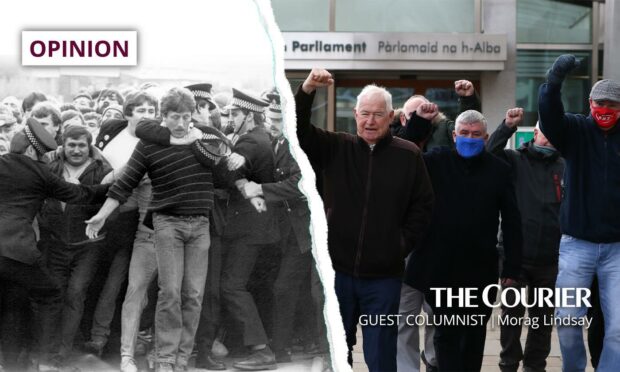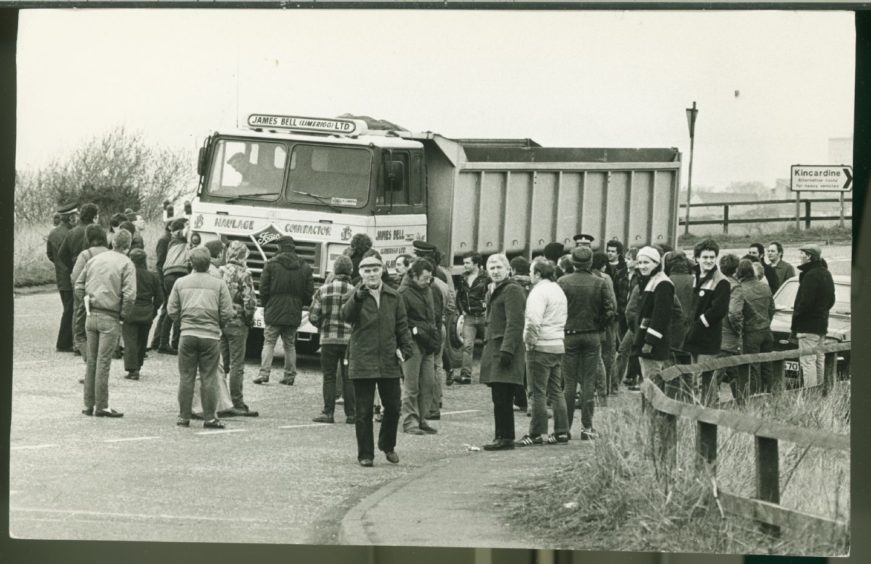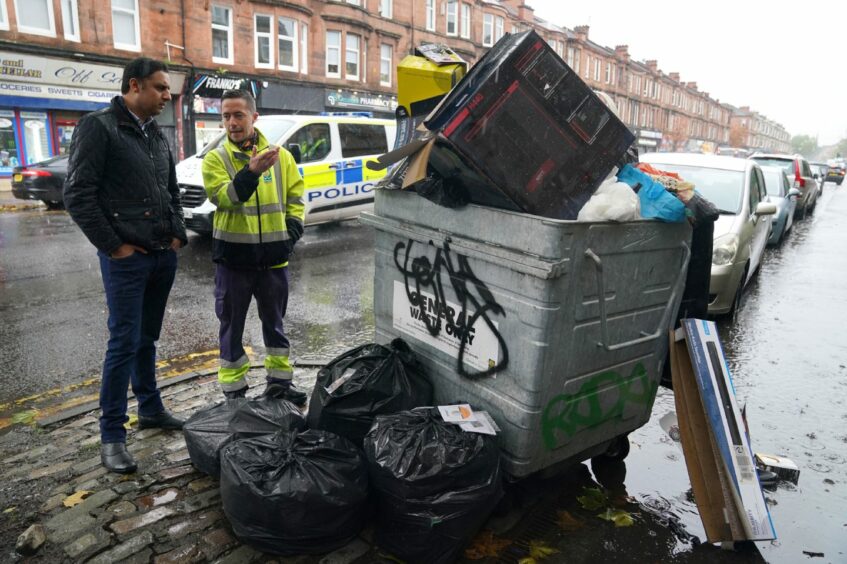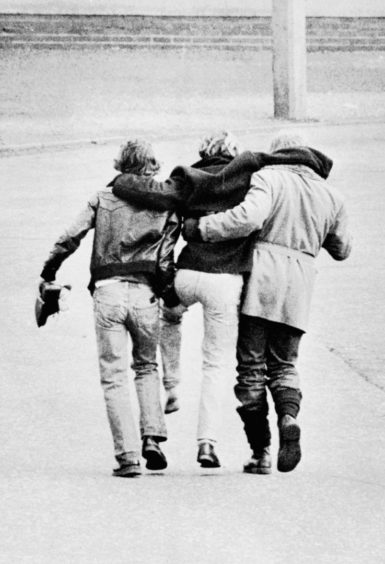The miners strike is probably why I became a reporter.
We had to do a project in modern studies at high school.
I’d been going to do something terribly fancy involving the UN convention on Human Rights and Amnesty International (I was a pretentious teenager).
And then I noticed something big was happening right under our noses.
My mum’s cousins were all miners you see.
And they were great folk.
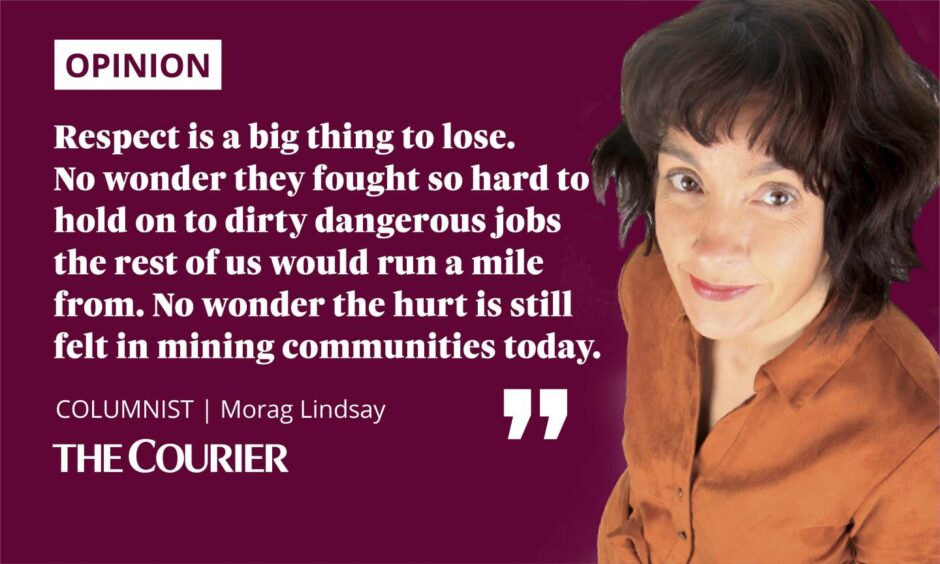
A visit to Cowie, near Stirling, was the best day out imaginable when we were kids.
And the anger and the violence and the hurt we were seeing on TV?
Well that just didn’t square with Auntie Betty, who wouldn’t let you leave without having your tea. And the kind sons who taped their Meatloaf LPs onto cassettes for you. And the parties that left your sides sore from laughing.
So I did the miners strike instead and resolved that this was how I’d make my tiny changes.
And now here I am.
Thirty-odd years a reporter and watching the miners strike shift from the realm of modern studies into history.
Miners strike pardons bring it back to the fore
The announcement this week that official pardons are on the way for convictions that happened as a result of the 1984-85 dispute has been hailed as a landmark move.
Former miners in Fife told my colleague Rachel it has been “a long time coming”.
An estimated 1,400 of their colleagues were arrested and 500 were convicted, many in mass arrests that happened as police clamped down on picketing.
If the Miners’ Strike (Pardons) (Scotland) Bill becomes law, as it likely will, it will mean men convicted of crimes, such as breach of the peace, will have their slates wiped clean.
Delighted this morning to launch the Miners Strike Pardons Bill, at the Polmaise Mining Museum, with the President of the NUM, Nicky Wilson and Cllr Alasdair MacPherson. pic.twitter.com/eWQUfxPOFt
— Keith Brown (@KeithBrownSNP) October 28, 2021
Some of them were sacked as a result of their convictions.
Some were blacklisted and didn’t work again.
And some died, having never had a chance to clear their names.
No wonder some like Pat Egan, 61, who worked at Frances Colliery, are welcoming the move – but with a caution that it has come “too little too late for a lot of people.”
Changed days but old scars run deep
It’s probably coincidence that the bill is being introduced in the Scottish Parliament as strike talk dominates the headlines at a rate we haven’t seen for a while.
ScotRail and the RMT union agreed a pay deal this week that means the trains will run during COP26.
Stagecoach averted a bus strike the week before.
The Glasgow bin strike that was threatening to overshadow COP26 was suspended on Friday after Cosla upped its pay offer to the unions.
I guess there’s nothing like the world’s news organisations turning their spotlight on a place to focus the minds of negotiators.
But for all the talk of a second winter of discontent it’s unimaginable that we would see unrest on the scale of the miners strike again.
And COP26 is another reason for it feeling like a part of our history already.
Climate change demands we shift away from fossil fuels.
Coal mining in Scotland would not have been compatible with the future we’re facing now.
But the way the closures were handled, the animosity that the strikes stirred up, and the harm done to mining communities through the years of under-investment that followed means those wounds that Justice Secretary Keith Brown talks about healing will still be running deep in places.
A pardon won’t fix all that at the stroke of a pen.
But it’s something.
People move on, memories remain
The publication of the pardons bill coincided with an anniversary.
Thursday marked 82 years since one of Fife’s worst mining tragedies.
The Valleyfield pit disaster on October 28 1939 claimed 35 lives and left 42 children fatherless.
We spoke to Cyril Caseby, 91, who remembers standing among the sobbing crowd as his own dad, the local minister, read out the names of the dead.
Cyril got a job there seven years later, preparing wage sheets for the miners, and told us: “My respect for the people who chose this for a profession rose enormously.”
Respect is a big thing to lose.
No wonder they fought so hard to hold on to dirty dangerous jobs the rest of us would run a mile from.
No wonder the hurt is still felt in mining communities today.
Miners strike pardons are a small step, but a necessary one
I keep up with my mum’s cousins on Facebook now.
It looks like they’re all doing really well.
I don’t know if any of them would choose to go down the pit now, or have their kids do it for a living.
But I bet they had it tougher than they let on for a while.
And I feel for all the families who struggled to get back on their feet.
If divisions persist between those who were on either side of the dispute nearly 40 years on, well who would blame them?
But for reconciliation to happen, an apology must first be given and accepted.
Then the hard work really starts.
So it’s a shame this bill is coming too late to undo so much of the damage that was done.
And it’s a tiny thing in the grand scheme of neglect that our mining communities were left to suffer.
But as we start to write the miners strike into our history, it feels like the right thing to do.
